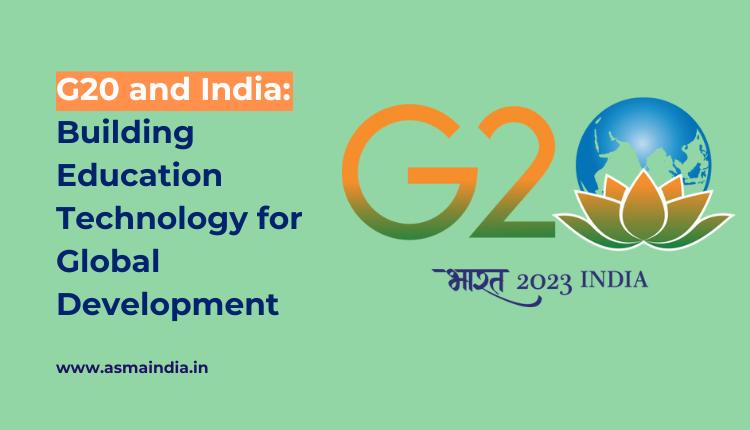G20 and India: Building Education Technology for Global Development
Content
- What is G20?
- G20 For Global Education.
- G20 Way to Enhance Indian Education Ecosystem.
- G20 Education Policies that Can Help in Enhancing Indian Education Ecosystem.
What is G20?
The G20 is a group for the world’s leading developed and developing countries. The 19 countries or states that make up the group include Argentina, Australia, Brazil, Canada, China, France, Germany, India, Indonesia, Italy, Japan, Republic of Korea, Mexico, Russia, Saudi Arabia, South Africa, Turkey, UK, and the United States. Other States, Governments, and international institutions including the World Bank, United Nations (UN), and International Monetary Fund (IMF) are welcome to attend the G20 conference in addition to these countries. The G20 brings together the world’s major and systemically important economies. Its members represent 85% of global GDP, 75% of international trade and two-thirds of the world’s population. ( Source DOFA, Australia)
G20 for Global Education
While the primary focus of the G20 is on economic issues, it recognizes the importance of education as a fundamental factor for sustainable development and inclusive growth.
It has the Education Working Group (EdWG) which was established in 2018 during Argentina’s Presidency. EdWG focuses on strengthening learning outcomes and equitable access through technological tools, digitalization, universal quality education, financing, partnerships for education and international cooperation. EdWG also collaborates with Employment and other WGs to address cross cutting issues like skill development and school-to-work transition.
G20 Way to Enhance Indian Education Ecosystem
In way of heading towards reformatory measures in Indian education, the G20 Education Working Group meeting in Chennai has incorporated several measures to amalgamate technology in education with the help of various national and international organizations. Along with the domain experts and member, other agencies like UNICEF, UNESCO, and OECD, and premier Indian institutions like the IITs at Madras, Hyderabad, Kharagpur and Ropar, IISc Bangalore, TISS Bombay, NIEPA, NCERT and National Skill Development Council, have also been invited to build a technologically abled education ecosystem in India.
In line with the theme of the G20 Meeting, AICTE jointly with Energy Swaraj Foundation (ESF) has launched a G20 initiative on “Youth Action for Climate Correction (YACC)” in line with Mission LiFE of Hon. Prime Minister. Climate is not changing, it has changed. Youths are important stakeholders of the future. Youth are going to stay longer on the planet and are going to face greater consequences of Climate Change. Several higher education institutes and universities have also organized and conducted several programmes based on G20 SDG for education.
India, being the 5th largest economy in the world and having the largest populations in the world, is actually a potential labour force for global growth. The G20 education member meeting has placed several actions that are important for India and the world to build a strong skilled-based work force to enhance productivity and efficiency, focusing more on the incorporation of technology in education with a special focus on China and India.
G20 Education Policies that Can Help in Enhancing Indian Education Ecosystem.
The G20 plays a role in the education sector through various initiatives and actions. These reformatory measures and actions must be leveraged by Government, Regulatory Bodies, HEIs across India to build a higher standard for Indian Educations.
Policy Dialogue and Knowledge Sharing:
The G20 provides a platform for member countries to engage in policy dialogue and share best practices in education. It facilitates discussions on educational reforms, strategies for improving access and quality, and addressing global education challenges.
Promoting Inclusive Education:
The G20 aims to promote inclusive education systems that ensure equitable access to quality education for all, including marginalized and vulnerable populations. It recognizes the importance of addressing barriers to education, such as gender disparities, poverty, disabilities, and refugee situations.
Skills Development and Employment:
The G20 recognizes the critical role of education in developing skills for the workforce. It focuses on fostering educational policies and programs that promote employability, entrepreneurship, and lifelong learning. This includes initiatives to bridge the gap between education and labor market demands and promote vocational and technical education.
Education Financing:
The G20 addresses the issue of education financing and the importance of sustainable investments in education. It promotes dialogue and cooperation among member countries to mobilize resources, leverage public-private partnerships, and improve the efficiency and effectiveness of education spending.
Digitalization of Education:
The G20 acknowledges the transformative potential of digital technologies in education. It supports efforts to leverage digitalization to enhance access to quality education, promote digital literacy, and develop digital infrastructure in schools and colleges.
Education in Emergencies:
The G20 recognizes the impact of conflicts, crises, and emergencies on education systems. It promotes efforts to ensure the continuity of education during emergencies, support educational infrastructure in affected regions, and address the specific needs of displaced populations, including refugees and internally displaced persons.
Global Education Agenda:
The G20 engages with international organizations and stakeholders to contribute to the global education agenda. It collaborates with organizations such as UNESCO, the World Bank, and the OECD to align efforts, share data and research, and support global initiatives like the Sustainable Development Goals (SDGs) and Education 2030.
Conclusion
While the G20’s role in the education sector is primarily through policy coordination and knowledge sharing, its influence lies in fostering international cooperation, setting agendas, and catalyzing action among member countries and relevant stakeholders to address education challenges and achieve sustainable development goals.



